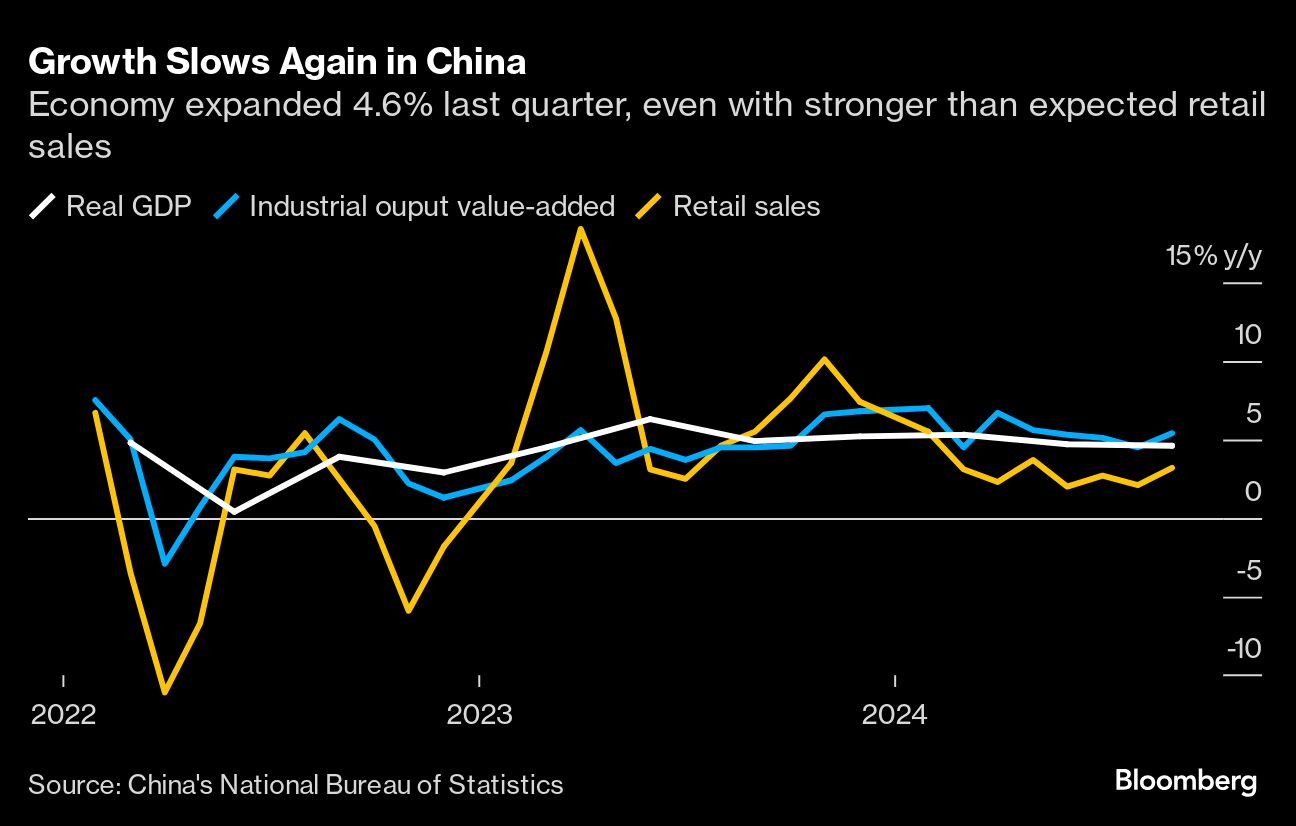
China's economic expansion slowed in the third quarter despite tentative signs of improvement last month, as policymakers ramp up stimulus to help the world's second-largest economy reach its annual growth target.
Gross domestic product increased 4.6% in the July-to-September period from a year prior, data released by the National Bureau of Statistics showed Friday, the slowest pace since March 2023 and down from a 4.7% expansion in the second quarter.
While slightly higher than the median estimate by economists, the quarterly figure meant growth for the first nine months fell to 4.8% — the lower end of China's full-year target of around 5%.
“It makes the official growth target of 5% difficult to achieve if this trend continues to year end,” said Zhiwei Zhang, president and chief economist at Pinpoint Asset Management. “This may be why the government decided in the Politburo meeting to change policy stance and boost growth.”

China's CSI 300 Index of onshore stocks rose 0.2% as of 10:30 a.m. local time. The Chinese yuan and its proxy currencies such as the Australian dollar and Korean won held small gains after the release of the economic data. The yield on 10-year Chinese sovereign bonds pared declines to stand near 2.1%.
China unleashed a swath of stimulus measures in late September including interest rate cuts and support for the property and equity markets to draw a line under a slowing economy.
The elite Politburo led by President Xi Jinping supercharged those stimulus measures with a vow to stabilize the beleaguered real estate sector. Investors now expect Chinese lawmakers to approve additional budget or debt sales to fund public spending in an upcoming meeting after authorities promised fiscal support.
The slate of measures prompted a historic stock rally and led banks including Goldman Sachs Group Inc. to upgrade their forecasts for China's growth. But skepticism has grown over whether authorities are willing to deploy greater fiscal firepower to turn around the economy and markets.
The stock market has been on a roller-coaster ride, with the benchmark CSI 300 Index soaring to its highest level since July 2022 in early October, before falling about 10% since then.
The other key indicators show a broad improvement in different parts of the economy in September:
Industrial production rose 5.4% from a year earlier, versus economists' forecast of 4.6% growth
Retail sales climbed 3.2%, beating a projected 2.5% gain
Fixed-asset investment expanded 3.4% in the first nine months, compared with a 3.3% increase expected by economists. The property sector continued shrinking, with investment plunging 10.1% in the first nine months
The urban jobless rate dropped to 5.1% from 5.3% in August
The better-than-expected retail sales figures in September likely received a boost from government subsidies for buying home appliances, which saw a 21% surge in sales from a year ago, picking up from a 3% gain in the previous month.
The NBS said there's reason for caution despite improvements in the main indicators as the stimulus measures are rolled out.
“We also need to see that the external environment is increasingly complex and grim, and the economy's foundation for rebound and improvement needs to be further solidified,” a spokesperson said in a statement accompanying the release.
Data released before Friday painted a mixed picture for growth in September. Exports slowed sharply, curbing a trade rebound that has been a bright spot for the economy. Deflationary pressures continued to build, with consumer prices still weak and factory gate prices falling for 24 straight months.
Xi called on government officials to “make every effort” in the fourth quarter to help the economy meet its annual growth target, state media reported on Wednesday. That's the second time in about a month Xi has urged officials to pursue economic growth.
Economists have urged Beijing to boost consumer spending to avoid a spiral of falling prices, which could risk a self-reinforcing cycle of declining spending, shrinking business revenues and job losses. But authorities have shown little urgency to ramp up consumption with any direct stimulus or large-scale handouts, which Xi has long resisted due to concerns over what he calls “welfarism.”
A housing sector slump in its fourth year has hurt a pillar of growth and weighed on sentiment. Beijing is seeking to stop the property decline with a basket of policies including a Thursday pledge to nearly double the loan quota for unfinished residential projects. The measures fell short of market expectations, causing property shares to retreat as investors looked for more forceful response to pull the sector out of the doldrums.
Essential Business Intelligence, Continuous LIVE TV, Sharp Market Insights, Practical Personal Finance Advice and Latest Stories — On NDTV Profit.























